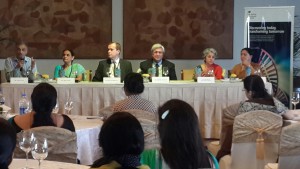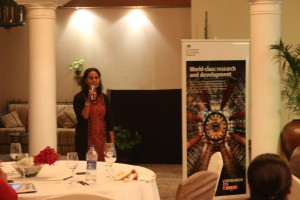26th November 2015 Mumbai, India
UK and India’s Prime Ministers shared commitment to tackle antimicrobial resistance

The theory of evolution has always fascinated me since my school days, but I had thought it to be a slow process. The pace at which multidrug resistant microbes have emerged across the world has been surprising! This is a major health crisis in the works. Are we doing enough to tackle antimicrobial resistance (AMR) as rapidly as possible? That the issue was discussed during the Indian Prime Minister’s visit to the UK points to the fact that high priority is indeed being given to the issue of AMR.

Indian PM Narendra Modi & UK PM David Cameron have “underlined their joint determination to address antimicrobial resistance (AMR), noting that it poses a grave public health and economic threat to both countries”. They agreed to render support to a high level meeting on AMR at the 2016 UN General Assembly. Our Prime Ministers also committed to contribute their scientific expertise to the global summit to be held in London next year as part of the AMR initiative of the Research Councils in the UK and the DBT in India. I would also like to flag the strong commitment of Research Councils UK (RCUK) & Department of Biotechnology (DBT) for collaborations including AMR and vaccine development.

Various other efforts to raise awareness about the problem are also underway. On 16th November 2015, the WHO observed the first day of its first Global Antibiotic Awareness Week (16-22 November 2015). The campaign aims to increase awareness of global antibiotic resistance and to encourage best practices among the general public, health workers and policy makers.
Another recent Indo-UK collaborative effort worth mentioning here is an MoU that was signed between the Jawaharlal Nehru Centre for Advanced Scientific Research (JNCASR) and the Public Health of England (PHE), for collaborative research on the development of a drug for Ebola.
And finally, I’d like to highlight developments on two important pieces of work that were mentioned in my previous blogs.
First, the latest paper from the independent review on AMR was released on October 23, 2015. As background, globally renowned economist and UK Treasury Minister Jim O’Neill, who is leading the UK Prime Minister’s review on global action to control the growing threat of AMR, visited India last year. He identified India as one of the countries whose engagement will be key to further coordinated global action.
Secondly, we are also building collaborations between UK and India AMR experts. Last month we organised a two-day workshop on new developments in AMR diagnostics and therapeutics last month. We held the workshop in Delhi where we brought together a range of stakeholders and experts from the UK and India, discussing the various issues concerning new diagnostics and therapeutics to tackle AMR. The participation of five UK experts and senior researchers– Professor Till Bachmann (University of Edinburgh), Professor Simon Croft (LSHTM), Professor Alan Fairlamb (Univeristy of Dundee), Dr Josephine Bryant (UCL) and Dr Marjorie Bardiau(Brighton University); senior researchers, key government representation, hospital and industry experts from India; and various funding agencies such as the Department of Biotechnology(DBT), DBT-Biotechnology Industry Research Assistance Council(BIRAC) and the Indian Council of Medical Research(ICMR) in India and the RCUK India, the Wellcome Trust and the NESTA representing the UK side; was reflective of the commitment, the synergy and the good relationship that exists between the ignited minds of the two countries.
Many interesting recommendations and opportunities for collaborative working were highlighted at the workshop- such as setting up of isolate or sample bio-banks for validation of new diagnostics in development, augmentation of surveillance networks for antimicrobial resistance patterns to guide international efforts, and policy changes needed to encourage R&D in new drugs and diagnostics for infectious diseases. Amongst other various interesting perspectives that were showcased, one which I thought would be worth mentioning here is the study of environmental AMR, presented by Brighton University. It highlighted the issue of environmental contamination contributing to AMR. There’re a lot of potential issues to address in this field, especially in a country like India where many pharmaceutical companies are present. A recent study by AIIMS that studied the river Yamuna confirms that this is indeed a problem. The proceedings of the workshop can be found here.